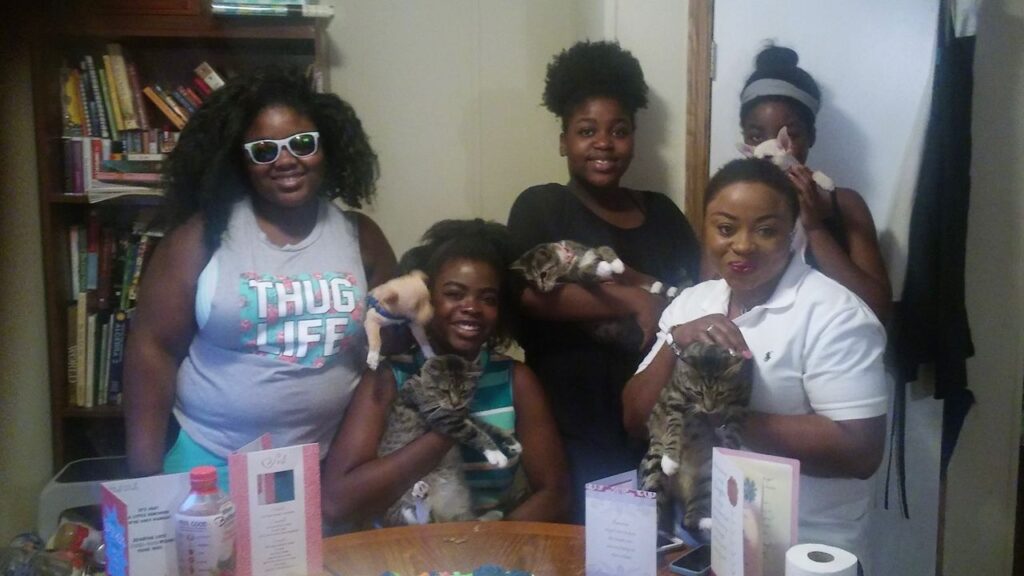The school year can look much different for children matriculating through the state’s foster care system.
The National Center for Education Statistics showed only 57% of North Carolina students in foster care graduate high school compared with about a 90% graduation rate for their peers.
Nita Nwakuche is proud to have graduated from high school as a product of the system, considering how much she had to overcome.
“I don’t remember a lot of my childhood because I used to dissociate a lot,” Nwakuche said.
Trauma-related dissociation is common for young people to mentally cope with a physical situation they cannot escape, according to research from the National Institutes of Health.
It’s why a person may distance themself from reality.
The Nigerian immigrant described a rocky home life caused by her biological mother’s battle with serious mental illnesses and a physically abusive biological father.
“When you look back, a child should never have gone through that,” Nwakuche said.
On the surface, Nwakuche, 28, radiates light to everyone she meets. The expressive and energetic woman endured much more as a little girl than the colorful personality others may notice when she talks about her goldfish.
As many North Carolina students are navigating their first semester, she sees a window of opportunity to educate people about life outside the classroom for many children.
“I knew that families went through things. I knew that families had their issues. I knew that families weren’t perfect,” Nwakuche said about a childhood full of turmoil and instability. “But from a young age, without being, having, having to be told, I knew that my parents wouldn’t want me to say anything about what was happening in my house.”
The N.C. Division of Social Services, which is part of the Department of Health and Human Services, removed Nwakuche and her three sisters from those unsafe living conditions to place in foster homes.
“I’m very much grateful for the time that they did find or they did put us in foster care, because it is why I’m where I am now, and it’s because why I am the person I am now,” Nwakuche said. “But for the sake of my sisters, for the sake of the little girl I was, I really wish that someone had found us sooner.”
Multiple social sciences journals show youth in foster care are three times more likely to move during the school year than their peers.
Volatility was a hallmark through adolescence, as she moved more than 18 times before the age of 19.
“I think in many ways I did survive it. I think in many ways I did survive it,” Nwakuche said.
From the homeland to the nation she called home, Nwakuche said she has moved 30 times.
Nwakuche said they moved to the United States for the first time with her younger twin sisters when she was 6. They bounced around countries and continents for a period of time until they returned to America for good at about the age of 10, with her mom, father and three sisters.
They moved in with relatives, but she said much of her home life growing up was never stable.
“That’s our foster care story,” Nwakuche said
It made creating friendships difficult because they were often not in one place long enough to meet new people.
“I didn’t grow up like other kids did. It kind of scared me,” Nwakuche said.
She said part of the differing experiences from her classmates is feeling out of her element in visible social gatherings, such as school dances.
“I understand y’all are dancing, and this seems fun for y’all, but I am terrified. It was such a disconnect,” Nwakuche said.
There were times when her biological father’s constant battle with keeping a job fueled tension at home before it led to evictions.
“When they went into the home to check and see if it was OK for us to live there, only his room had a bed. His room was fully furnished, but our room, we were sleeping on the floor,” Nwakuche said.
“For a lot of my life, I feel like I have been on autopilot just doing what people expected of me,” Nwakuche said.
As the eldest sibling, she had to put her younger sisters before herself on many occasions.
NCDHHS reports more than 10,000 children younger than 18 years old in the state’s foster care system.
Many of them juggle mental and emotional health needs from new settings and expectations as students.
Finding people who can appreciate a similar journey in life resonates so much with Nwakuche. It’s why establishing structure later on as an adult with people drawing from the same experiences is key.
Nwakuche said she found that kind of kinship at Hope + Vine in Wake Forest, where she met Executive Director Rene Monot.
“We can kind of be that support where most of us would traditionally call our family, they can call us for support,” Monot said.
Monot is a trusted face Nwakuche knows through the faith-based nonprofit. Hope + Vine works with young women who have aged out of the foster system. Monot said they offer employment and a chance to harness empowering life skills to break the cycle of trauma.
“They always have a place to come back to whether they are working with us or just need a place to step in,” Monot said.
Located near suburban shopping stores, the space is a place for growth, fellowship and forming bonds knowing they are not alone.
“I keep having to remind myself and God keeps having to remind me that I am loved. I am precious. I am adored. I am wanted,” Nwakuche said.

